Mayfest opens today for its forty-fourth year.
The festival was inaugurated on May 5, 1973, sharing the front page of the Star-Telegram with headlines about Watergate.
But before there was Mayfest in Trinity Park, hosted by Mayfest, Inc., there was Maifest in Hermann Park, hosted by the Railroad Boys’ Social Club. Before that, there was Maifest in Hermann Park, hosted by Sons of Hermann lodge. And before that, there was Maifest in Rosedale Pavilion and in Como Park, hosted by the Como Social Club.
 To tell our story, let us turn the cuckoo clock back to 1888. That’s when the Como Social Club, a German social club, was formed in Fort Worth. On May 1, 1890 the club held its first Maifest at Rosedale Pavilion on Samuels Avenue, which was still outside the city limits. Mayfest (“Maifest” in German) is the traditional German celebration of the arrival of spring. Note that the May queen in 1890 was Emily Monnig of the department store family. Family patriarch Otto Monnig had been born in Germany. Como Social Club president Louis H. Schubert operated a saloon on Houston Street and a beer garden on Main Street. Clip is from the May 2 Gazette.
To tell our story, let us turn the cuckoo clock back to 1888. That’s when the Como Social Club, a German social club, was formed in Fort Worth. On May 1, 1890 the club held its first Maifest at Rosedale Pavilion on Samuels Avenue, which was still outside the city limits. Mayfest (“Maifest” in German) is the traditional German celebration of the arrival of spring. Note that the May queen in 1890 was Emily Monnig of the department store family. Family patriarch Otto Monnig had been born in Germany. Como Social Club president Louis H. Schubert operated a saloon on Houston Street and a beer garden on Main Street. Clip is from the May 2 Gazette.
 By 1891, these Gazette clips show, the Como Social Club had its own park. Note that among the principal beverages at the 1891 Maifest was the “ever famous” beer from Fort Worth’s own Texas Brewing Company (fifty-six kegs consumed) and that among the attractions and activities were a “jangoloo” (jangaloo is a Hindi word meaning “savage”), a sack race, an egg race, the champion pedestrian of the world, and a pantaletted donkey.
By 1891, these Gazette clips show, the Como Social Club had its own park. Note that among the principal beverages at the 1891 Maifest was the “ever famous” beer from Fort Worth’s own Texas Brewing Company (fifty-six kegs consumed) and that among the attractions and activities were a “jangoloo” (jangaloo is a Hindi word meaning “savage”), a sack race, an egg race, the champion pedestrian of the world, and a pantaletted donkey.
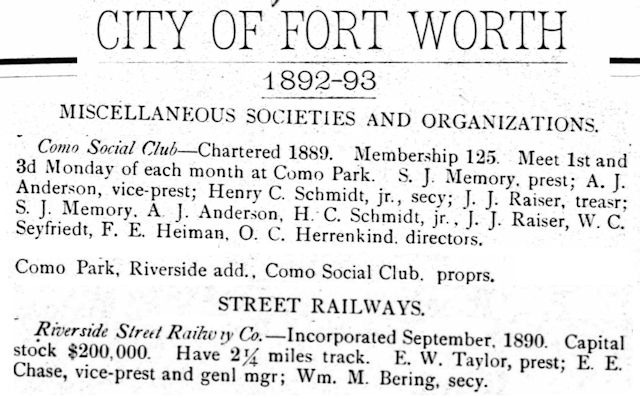
 Como Park, not to be confused with the trolley park at Lake Como (created in 1890 as part of Humphrey B. Chamberlin’s development of Arlington Heights), was located in Riverside at the terminus of the Riverside streetcar line, which operated for only two years in the early 1890s.
Como Park, not to be confused with the trolley park at Lake Como (created in 1890 as part of Humphrey B. Chamberlin’s development of Arlington Heights), was located in Riverside at the terminus of the Riverside streetcar line, which operated for only two years in the early 1890s.
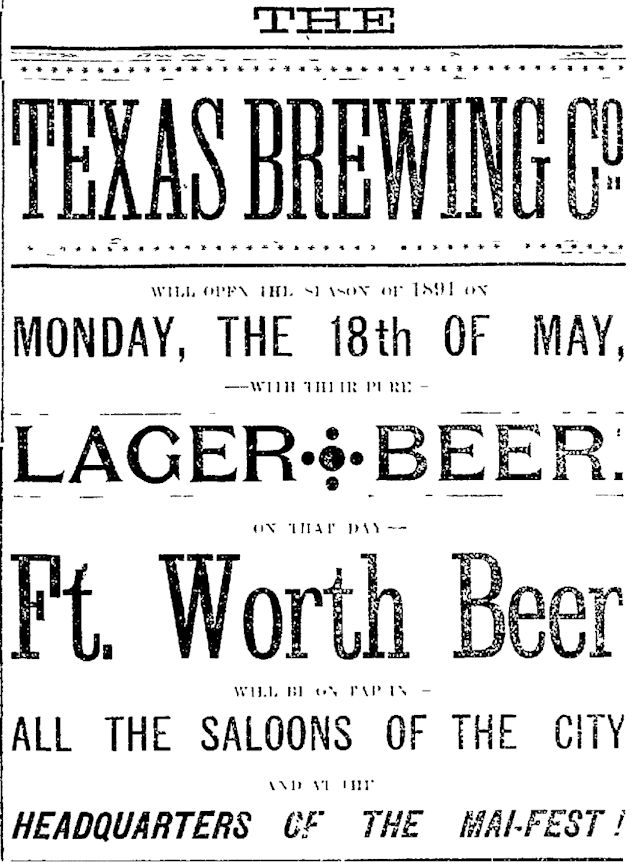 Texas Brewing Company had opened just in time to wet whistles at the 1891 Maifest.
Texas Brewing Company had opened just in time to wet whistles at the 1891 Maifest.
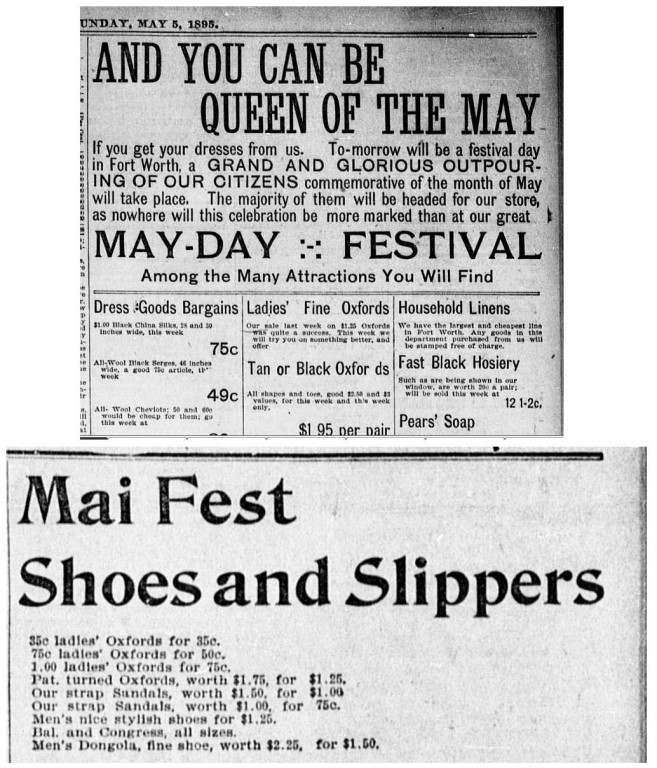 Meanwhile, Gazette ads of 1895 show, the Maifest marketing angle was not lost on local retailers.
Meanwhile, Gazette ads of 1895 show, the Maifest marketing angle was not lost on local retailers.
 By 1897, as this Register clip shows, the Sons of Hermann lodge was hosting its Maifest at its park: fireworks, a hot-air balloon ascension, assorted races. The Fencibles and Loyd’s Rifles were local militia units.
By 1897, as this Register clip shows, the Sons of Hermann lodge was hosting its Maifest at its park: fireworks, a hot-air balloon ascension, assorted races. The Fencibles and Loyd’s Rifles were local militia units.
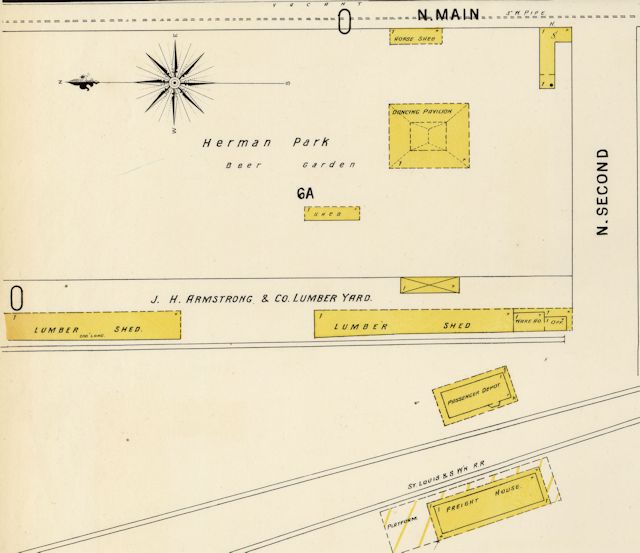 Hermann Park (and beer garden) was located between the West Fork of the Trinity River and North Main Street at Northwest 2nd Street. Sons of Hermann had begun as a mutual protection society for German immigrants in 1840 in New York. The Fort Worth lodge hosted its Maifest in Hermann Park well into the twentieth century.
Hermann Park (and beer garden) was located between the West Fork of the Trinity River and North Main Street at Northwest 2nd Street. Sons of Hermann had begun as a mutual protection society for German immigrants in 1840 in New York. The Fort Worth lodge hosted its Maifest in Hermann Park well into the twentieth century.
 But by the turn of the century, as this 1901 Register clip shows, the Fort Worth branch of the Railroad Boys’ Social Club got in on the Maifestivities, hosting its own Maifest at Hermann Park. Prizes to race winners included a marriage license. The club had branches in other large cities such as San Francisco, San Antonio, and Atlanta.
But by the turn of the century, as this 1901 Register clip shows, the Fort Worth branch of the Railroad Boys’ Social Club got in on the Maifestivities, hosting its own Maifest at Hermann Park. Prizes to race winners included a marriage license. The club had branches in other large cities such as San Francisco, San Antonio, and Atlanta.
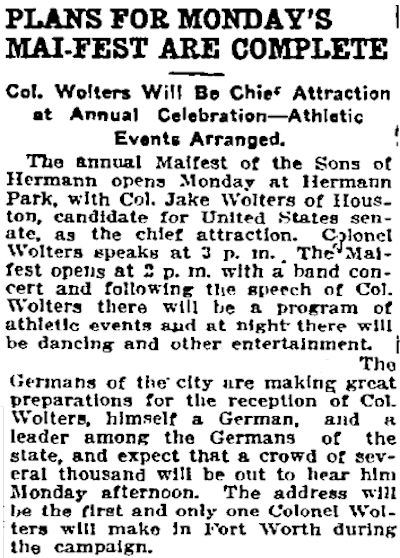 This clip from the May 19, 1912 Star-Telegram shows that Sons of Hermann continued to host their Maifest at Hermann Park. Special guest that year was Colonel Jake Wolters, born in Texas of German ancestry. Wolters, an antiprohibitionist, would lose his U.S. Senate race to prohibitionist Morris Sheppard. On April 4, 1917—the day the U.S. Senate voted to declare war on Germany—Sheppard would introduce the Eighteenth Amendment, ushering in prohibition in 1920.
This clip from the May 19, 1912 Star-Telegram shows that Sons of Hermann continued to host their Maifest at Hermann Park. Special guest that year was Colonel Jake Wolters, born in Texas of German ancestry. Wolters, an antiprohibitionist, would lose his U.S. Senate race to prohibitionist Morris Sheppard. On April 4, 1917—the day the U.S. Senate voted to declare war on Germany—Sheppard would introduce the Eighteenth Amendment, ushering in prohibition in 1920.
In 1925 a new Army camp (later fort) near Mineral Wells would be named for—you guessed it—legislator and soldier Jacob Franklin “Jake” Wolters.
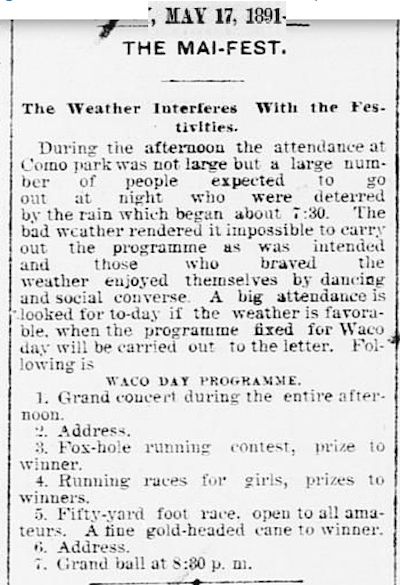
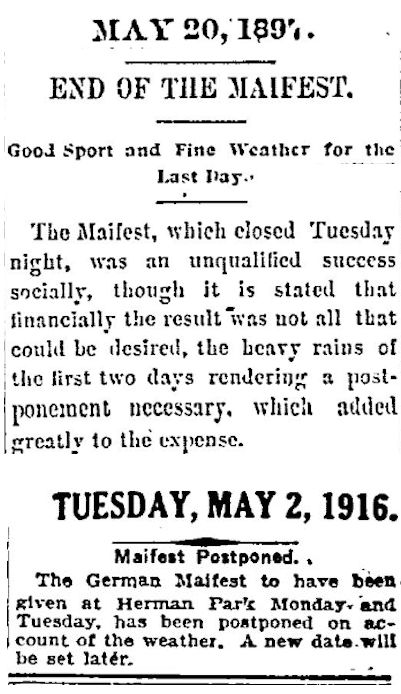 If you were in Fort Worth in 1995 you remember the horrific hailstorm that battered Mayfest. We should not be surprised. As these clips show, since the nineteenth century Mother Nature has never let us forget that when it comes to blessing the annual event with gutes Wetter, she Mai, and then again she Mai not.
If you were in Fort Worth in 1995 you remember the horrific hailstorm that battered Mayfest. We should not be surprised. As these clips show, since the nineteenth century Mother Nature has never let us forget that when it comes to blessing the annual event with gutes Wetter, she Mai, and then again she Mai not.
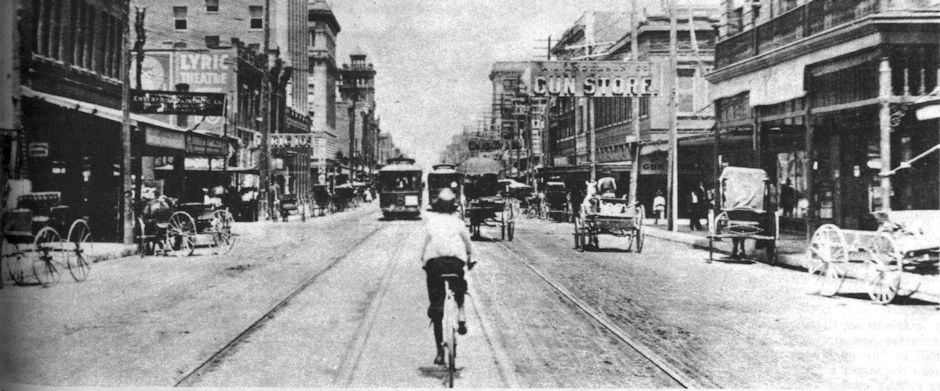





I wonder how many participants there would be nowadays to sign up for the ” fat ladies” race?
That’s why I love reading old newspapers, Jim. They were reporting everyday events, not retelling history after the fact, and they remind us of how much the world has changed in a short time.